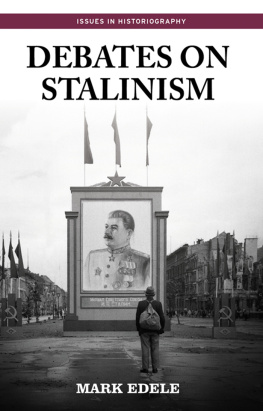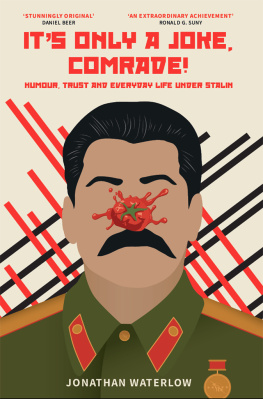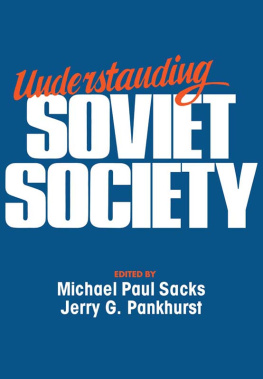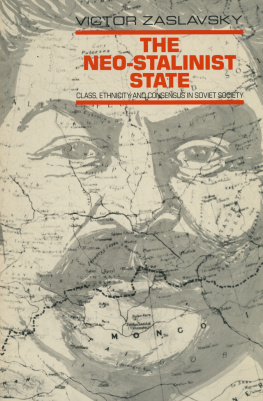
SERIES ADVISERS
Geoff Eley, University of Michigan
Lyndal Roper, University of Oxford
Mark Edele is Associate Professor in History at the University of Western Australia. Born and raised between books and mountains in Bavarias south, he received much of his education in Germany (MA, University of Tbingen), learned Russian in St. Petersburg, and earned an MA and PhD from the University of Chicago. In 2004, he moved to Perth, Western Australia, to teach continental European and Russian history. His research has been published, among others, in Slavic Review, Kritika, Acta Slavica Iaponica, the Jahrbcher fr Geschichte Osteuropas, Russian History as well as in the collections Late Stalinism: Society between Reinvention and Reconstruction ed. Juliane Frst (Routledge, 2006) and Beyond Totalitarianism ed. Sheila Fitzpatrick and Michael Geyer (Cambridge University Press, 2009). He is the author of Soviet Veterans of the Second World War: A Popular Movement in an Authoritarian Society (Oxford University Press, 2008). Stalinist Society is his second book.
Stalinist Society 19281953
MARK EDELE


Great Clarendon Street, Oxford OX2 6DP
Oxford University Press is a department of the University of Oxford.
It furthers the Universitys objective of excellence in research, scholarship,
and education by publishing worldwide in
Oxford New York
Auckland Cape Town Dar es Salaam Hong Kong Karachi
Kuala Lumpur Madrid Melbourne Mexico City Nairobi
New Delhi Shanghai Taipei Toronto
With offices in
Argentina Austria Brazil Chile Czech Republic France Greece
Guatemala Hungary Italy Japan Poland Portugal Singapore
South Korea Switzerland Thailand Turkey Ukraine Vietnam
Oxford is a registered trade mark of Oxford University Press
in the UK and in certain other countries
Published in the United States
by Oxford University Press Inc., New York
Mark Edele 2011
The moral rights of the author have been asserted
Database right Oxford University Press (maker)
First published 2011
All rights reserved. No part of this publication may be reproduced,
stored in a retrieval system, or transmitted, in any form or by any means,
without the prior permission in writing of Oxford University Press,
or as expressly permitted by law, or under terms agreed with the appropriate
reprographics rights organization. Enquiries concerning reproduction
outside the scope of the above should be sent to the Rights Department,
Oxford University Press, at the address above
You must not circulate this book in any other binding or cover
and you must impose the same condition on any acquirer
British Library Cataloguing in Publication Data
Data available
Library of Congress Cataloging in Publication Data
Data available
Typeset by SPI Publisher Services, Pondicherry, India
Printed in Great Britain
on acid-free paper by
MPG Books Group, Bodmin and Kings Lynn
ISBN: 978-0-19-923640-4 (hbk.)
978-0-19-923641-1 (pbk.)
1 3 5 7 9 10 8 6 4 2
Dedicated to the Memory of Marc Flament (19292010)
PREFACE
This book was written entirely in Western Australia, a place whose beauty, calm and relaxed way of life is in sharp contrast to the society I was immersed during reading and writing hours. I owe thanks not only to my home institution, the University of Western Australia (UWA), which allowed me to jump-start this new project during a six-month sabbatical in 2008, but also to many individuals without whom life outside the study would be lonely and boring.
First among them is my wife, Debra McDougall, who despite a busy schedule as a scholar, a mother, and a daughter, found time to not only listen to my preoccupations but also to serve as censor, copy-editor, and grammar police of the final product. Our daughter, Anna Dunateko Edele, emerged into this world about halfway through writing this book, and was a fabulous companion ever since. Anna decided after two months that sleeping through the night was what civilized beings did, thus freeing her parents from the burden of walking through life as red-eyed zombies. Without her cooperation, this book would never have been finished so relatively close to the deadline. With her enthusiasm for Good Night, Gorilla and the always elusive green sheep, Anna also opened up a whole new world of literature to me, bringing welcome change from my usual fare. My mother, Brigitte Edele, and my in-laws David and Carol McDougall, travelled at crucial points around the globe, in order to keep Anna company and her parents fed. Without their help the last year of this project would have been impossible. David van Mill helped enormously with another big project also underway simultaneously. Who would have thought that political philosophers could be so useful?
Several of the chapters of this book were written in Matt and Jane Daviss wonderful Gnarabup beach house, which they let us for unreasonably low rates. Together with their sons Harry and Sam, they were also crucial for companionship, encouragement, and sound advice (attack! attack!) in all things recreational.
At UWA, David Medlen in the Humanities and Social Science Library, together with the hard working staff of the inter-library loan department, made my work possible in the first place. Sally Carlton provided research assistance early in the project, and the students in my honours course on StalinismJames Curry, Aimee Lamatoa, and Jared Barnettserved as first critics to my ideas. Karina Diegel, a rare Russian native speaker out West, went to great lengths to ensure that her answer to my question about omelets and eggs was on a sound empirical basis. Thanks to her, I now know that you cant make an omelette without breaking eggs is an idiomatic translation of if you chop wood, chips will fly rather than a saying dear to axe-wielding Bolsheviks. Rebekah Moore insisted on the ethical dimension of historical writing despite her advisors sceptical retorts and cynical jokes. She also commented on Chapter nine and shared her expertise on the Holodomor debate, including a fine bibliography, which eased navigation of this literature significantly. Finally, she helped teaching two of my undergraduate courses, always asking the right questions, some of which I tried to answer in this book. Roderic Pitty, the, for a while, somewhat hidden second Russianist at UWA, continues to point me towards relevant literature while Ethan Blue helped teach an unprecedented number of first year students during the semester in which I finished the penultimate draft of this book. Although I would quibble, on historical grounds, with the notion that teaching with me is like working for Hitler, Ethan at times must have come close, Rudolf Hess-like, to board a plane and bail out. Instead, he cheerfully endured a rather Stalinist regime of forging hardened student cadres, which left his temporary boss at least some hours every week to write.
Several chapters were read and critiqued by the UWA History Staff reading group. In particular, I would like to thank Susie Protschky, Sally Carlton, Rob Stuart, and David Barrie for their feedback, good cheer, , which prompted further revisions. Michael Geyers remarks about doughnut-shaped arguments and the absence of society were particularly pertinent. Sheila Fitzpatrick read and commented on the entire draft before it went to the workshop. While she did not agree with everything, particularly in the last chapter, her feedback was, as always, extremely helpful.
Next page







